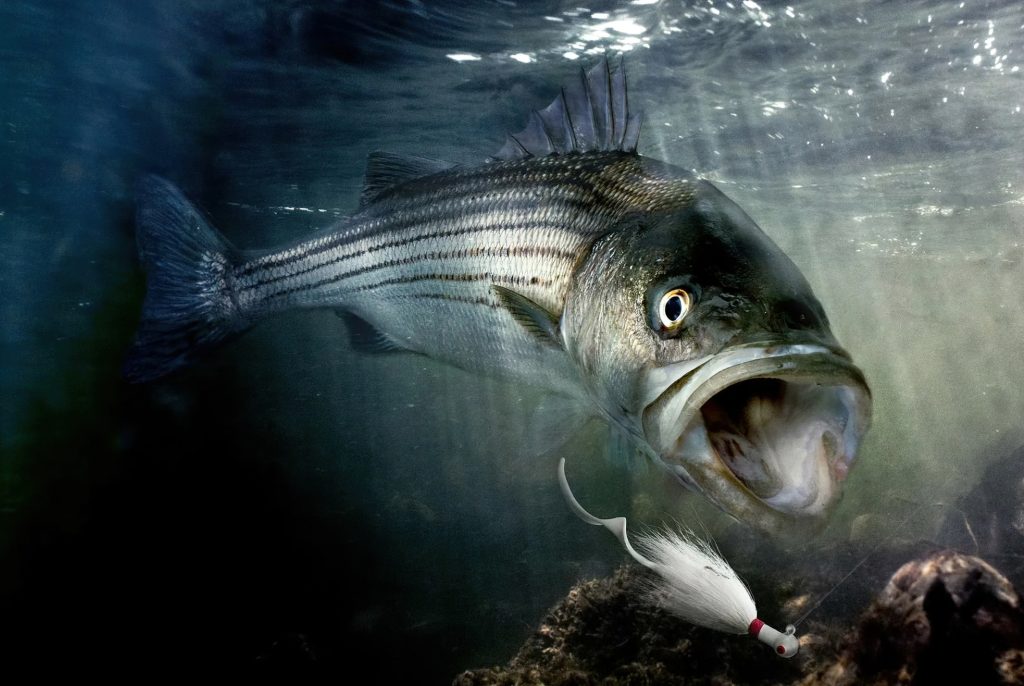Springtime striped bass fishing is a thrilling experience that every angler should experience. These trophy fish are highly sought after, and for good reason. Not only are they challenging to catch, but they also put up an incredible fight when hooked. In this article, we’ll explore the essential techniques and strategies for catching striped bass in the springtime.
Understanding Striped Bass Behavior in Springtime
To become a successful striped bass angler, it’s important to understand their behavior in the springtime. Striped bass typically move into shallower waters during this time of year to spawn, making them more accessible to anglers. They also tend to be more active during low-light periods, such as dawn and dusk, so it’s important to plan your fishing trips accordingly.
Essential Gear for Springtime Striped Bass Fishing
When it comes to springtime striped bass fishing, having the right gear can make all the difference in your success on the water. As a professional angler, it’s essential to invest in quality gear that will hold up to the rigors of the sport. Here are some of the essential gear items to consider for your next striped bass fishing trip:
- Rods and Reels: The most important gear for any angler is their rod and reel. For springtime striped bass fishing, it’s best to use a medium-heavy or heavy-action rod that is between 7-8 feet long. Match the rod with a high-quality reel that has a good drag system and a line capacity of at least 250 yards.
- Line: The type of line you use can also affect your success when fishing for striped bass. Braided line is a popular choice because it is strong, sensitive, and has minimal stretch. Aim for a line weight of between 20-30 pounds, depending on the size of the fish you’re targeting.
- Lures: Springtime striped bass can be finicky, so it’s important to have a variety of lures on hand to try different presentations. Consider using topwater plugs, swimbaits, jigs, and soft plastic baits. Make sure to have different sizes and colors to match the conditions and the type of forage in the area.
- Accessories: Lastly, don’t forget about the small but important accessories that can make your fishing trip more comfortable and efficient. Some key items include polarized sunglasses, a good hat to protect you from the sun, a quality fishing vest to keep your gear organized, and a waterproof tackle bag to keep your gear dry.
Top Techniques for Catching Striped Bass in Springtime
When it comes to springtime striped bass fishing, using the right techniques can make all the difference in landing a trophy fish. Here are some top techniques that professional anglers swear by:
- Jigging: Jigging is a versatile technique that can be used in a variety of depths and conditions. It involves using a weighted lure that is bounced up and down off the bottom of the water. This motion imitates the natural movement of prey and can attract hungry striped bass.
- Live Bait: Live bait is a classic technique that is still incredibly effective in springtime. Anglers often use live eels or bunker to entice striped bass. The key to success is to keep the bait alive and moving in a natural manner.
- Trolling: Trolling is another technique that can be effective in springtime. This involves dragging a lure or bait behind a moving boat. The key is to vary the speed and depth to find the optimal conditions for catching striped bass.
- Surface Lures: Surface lures are a fun and exciting way to catch striped bass. These lures are designed to float on the surface of the water and create a commotion that attracts fish. Anglers can use a variety of techniques to make the lure dance and splash, which can trigger a strike from hungry striped bass.
Strategies for Finding Striped Bass Hotspots
Knowing where to find striped bass is key to catching them. Look for areas with structure, such as rocks, jetties, or drop-offs, as these provide cover and ambush points for striped bass. Also, pay attention to water temperature and current, as these can influence where striped bass will be feeding.
Catch and Release Best Practices
As anglers, it’s our responsibility to practice catch and release to preserve striped bass populations for future generations. When releasing a fish, handle it with care and minimize its time out of the water. Use barbless hooks to make releasing the fish easier, and revive it in the water before letting it go.
Conclusion
By understanding striped bass behavior, having the right gear, and using effective techniques and strategies, you can become a successful springtime striped bass angler. Remember to practice catch and release best practices to preserve these trophy fish for future generations to enjoy. Happy fishing!

